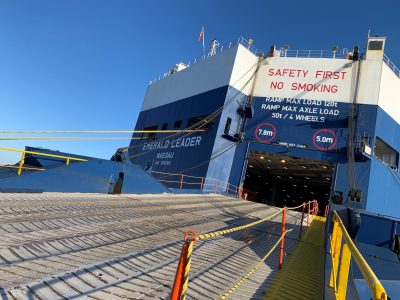- <
- Home ›
Guide to Exporting Goods from the UK

Customs Checklist
Before you export goods out of the UK, you’ll need customs clearance from HMRC. We can help you manage that.
Simply coordinate with our shipping experts, and they’ll communicate with HMRC on your behalf. To do so, we will need your:
- The customs procedure code
- The commodity code
- Your declaration unique consignment reference which is the main reference number that links declarations
You also need to provide information like:
- The departure point and destination
- The consignee and consignor
- The type, amount and packaging of your goods
- The transport methods and costs
- Currencies and valuation methods
- Certificates and licences

Get your export documentation right
The biggest confusion around exports is documentation. There are 5 steps to understand it, and most importantly - get it right.
- You must understand the documentation and regulations that are required. First, check what documents you need for your specific product and obtain a customs code and determine if an export license is necessary.
- Next, research the documentation required for the country you're exporting to. This may include:
- Import license
- Certificate of Origin
- Other documents verifying the product's origin
The Chamber of Commerce often issues these certificates. It's essential to consider if you need insurance coverage for your goods.
- To
ensure a smooth shipping process, create a packing list with a product
description, customs code, dimensions and weight, and packaging
information.
- Provide a Pro-forma invoice to your customer that includes their name and address, product description and customs code, unit count, unit price, total price, currency, and agreed credit and delivery terms (Incoterms).
- Establish the lead time for getting your product packed and ready for shipment.
To ship across borders, you need the correct paperwork. Missing or inaccurate documents could lead to delays, extra costs, fines, or even prevent a deal from being completed.
Get to know the paperwork required from our experts, as different documents are specific to your shipping or transport method.
Air freight documentation
What is an airway bill?
An "air waybill" is a vital document that establishes the agreement between your business and your carrier.
However, the e-freight project is working towards a future where all paper-based documentation is eliminated.
You can visit the International Air Transport Association (IATA) website for more details.
Sea freight documentation
What is a Sea Waybill?
You'll need a document that clearly identifies the consignment owner and outlines the terms of the carriage contract. This is where a Bill of Lading or Sea Waybill comes in.
What is a Bill of Lading?
Freight cannot be moved without a Bill of Lading. This legally binding document contains the information necessary to process and invoice the freight correctly. It is essentially a contract between a freight carrier and shipper.
Where will I get a Bill of Lading?
When companies overseas accept your goods, they'll issue you with a Bill of Lading or Air Waybill which creates a contract. The acceptance of your goods with these documents creates a contract. This includes the terms and conditions under which the shipping - or airline agrees to move your goods.
Another smart move is safeguarding against non-payments by insuring the goods or using a Letter of Credit.
Keep in mind that exchange rates can fluctuate, so it's a good idea to take measures to minimise potential losses, such as matching or hedging your currency exposure.
It's important to be cautious about releasing the goods before full payment has been received, especially if you're uncertain about your customer's creditworthiness.
These documents provide documentary security and give you more control over your consignments.
Choose your method of shipping and transport
When transporting your goods, you have several options, including road, rail, air, and sea.
The choice of transportation method may depend on your budget, timescales, and the nature of your product, such as size, weight, perishability, security, and special requirements.
It's important to consider all options and not just go for the most obvious one.
That's where we come in. We can help you weigh the pros and cons of different transportation methods and offer a wide range of expertise and services.
Consolidate smaller shipments to help you save time and money
Provide expert guidance on transportation regulations and customs compliance
Assist in navigating the complexities of new markets and unfamiliar territories
Manage all aspects of multimodal transportation, including logistics, scheduling, and tracking
Know your customs and licenses responsibilities
As an exporter, your primary focus is on getting your product or service to your customer, so you can receive payment and ensure customer satisfaction.
However, it's also important to comply with UK export laws and regulations.
In the UK, these regulations are generally straightforward, but they can vary depending on the type of product or service being exported and the destination country.
Below are a few things to keep in mind:
Customs duties and reliefs
Intrastat declarations
Export licenses
Temporary export permits (for trade fairs, for example)
Certificates and permissions
Sanctions
It's essential to comply with relevant regulations before shipping your goods or delivering any services. It's also important to research and consider these regulations during the early stages of your dealings so that you can factor in the time and cost required to comply with them.
Also, it's important to note that an EORI number may be required to trade goods with countries outside the EU. However, this number is not required for private individuals.
Apply for your EORI number
When applying for an EORI number, the application form you need to fill in will depend on your current VAT registration status.
You'll need to fill out a specific form if you're registered for VAT. If you're not VAT-registered, but you're exporting, there is a designated form for that as well.
Once you've completed the appropriate form, you'll typically receive your EORI number via email within three working days.
Give this number to our team at Premiership, as we will use it when arranging your customs declarations.
Before you export
1. Do your market research
One thing you should definitely do is check out some local exhibitions and trade fairs. Not only will you show off your product, but you'll also be able to gauge its demand and scope out the competition.
Make sure you're aware of applicable prices, taxes, and regulations. And don't forget to double-check that your product meets local standards.
You should also reach out to your Chamber of Commerce and UKTI. They can provide valuable advice and support on your export journey. And if it makes sense for your product, consider finding a local agent or partner who can help with distribution and post-sale support, like product maintenance.
Once you've gathered all this information, put together an export strategy, allocate your resources, and set some goals for this new market. And don't forget to use Incoterms to avoid any confusion.
2. Agree on Incoterms with your customers
When partnering with an international buyer, it's essential that you, and your customer, are on the same page regarding responsibilities. One way to do that is by including PaterIncoterms in your contract.
What are Incoterms?
Incoterms, or International Commercial Terms, is an internationally recognised system of terms that clearly outline the delivery of goods.
They cover everything from where the goods will be delivered, who's responsible for arranging transport and insuring the goods, and who handles customs procedures and pays any duties or taxes.
What do I need to know?
It's important to remember that Incoterms only cover the delivery of goods and not when the title of the goods is transferred or the price, currency, or credit terms which need to be agreed upon separately in the sales contract.
But using Incoterms in your contract can help you avoid confusion and ensure a smooth partnership with your international buyer.
3. Agree on terms of payment
When it comes to international trade, it's essential to understand payment terms with your buyer clearly.
Make sure you have a solid plan and consider credit options if needed. One way to protect yourself is by keeping hold of the Bill of Lading until you've received full payment.
How Premiership can help with export from the UK
Do you need a shipping partner that can handle all your global cargo transportation needs? Look no further because we've got you covered. Our fleet is versatile, scalable, cost-effective, and secure.
With our cargo tracker, you'll be able to keep an eye on your goods every step of the way. No more wondering where your cargo is; you'll have all the updates you need.
And don't worry about any Customs hiccups. Our dedicated and experienced team knows all the requirements and will ensure your goods have a smooth journey to their destination.